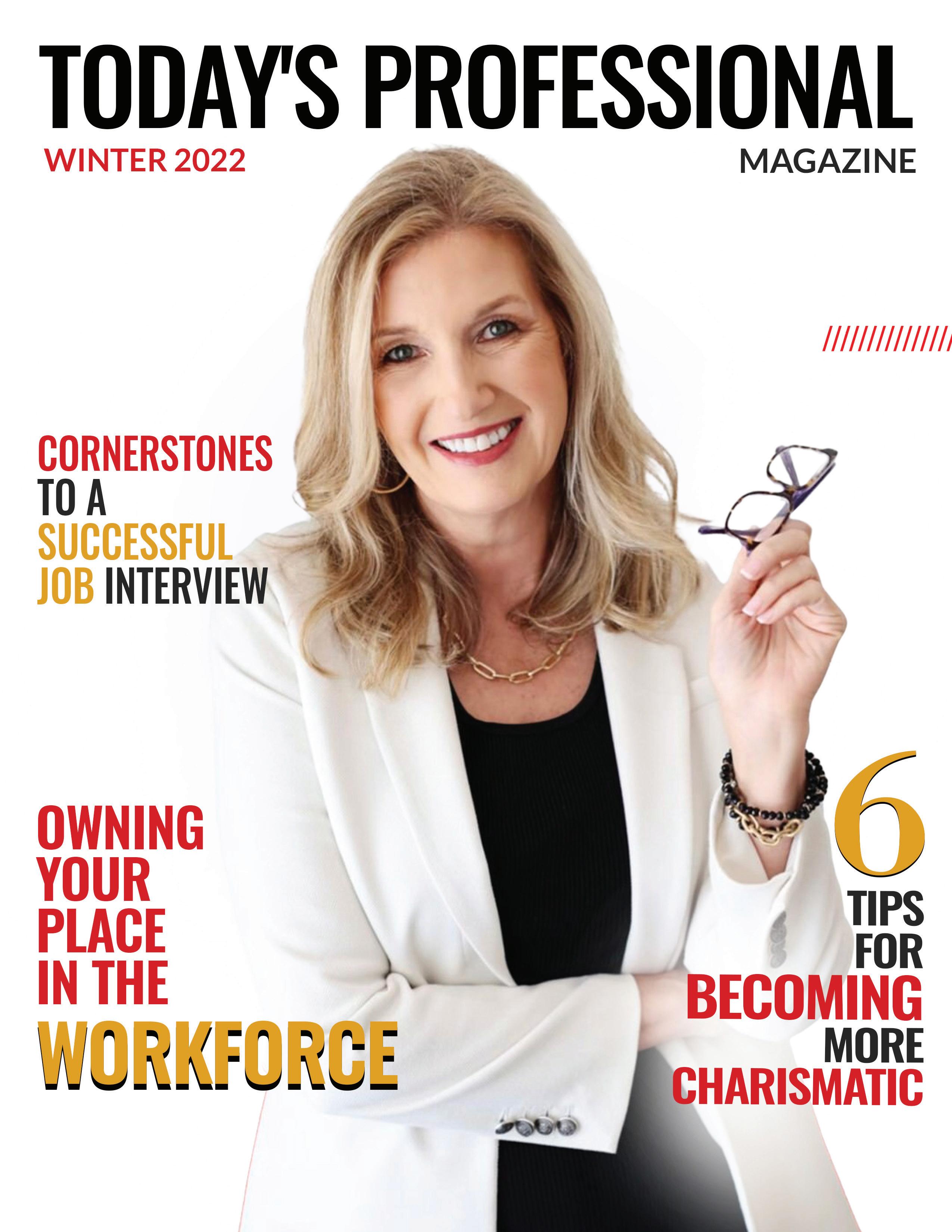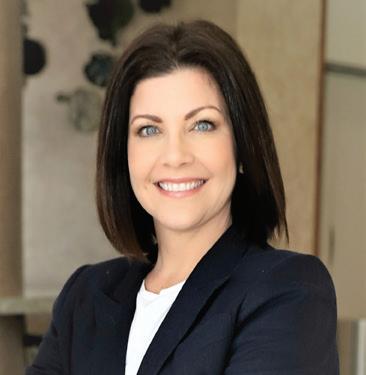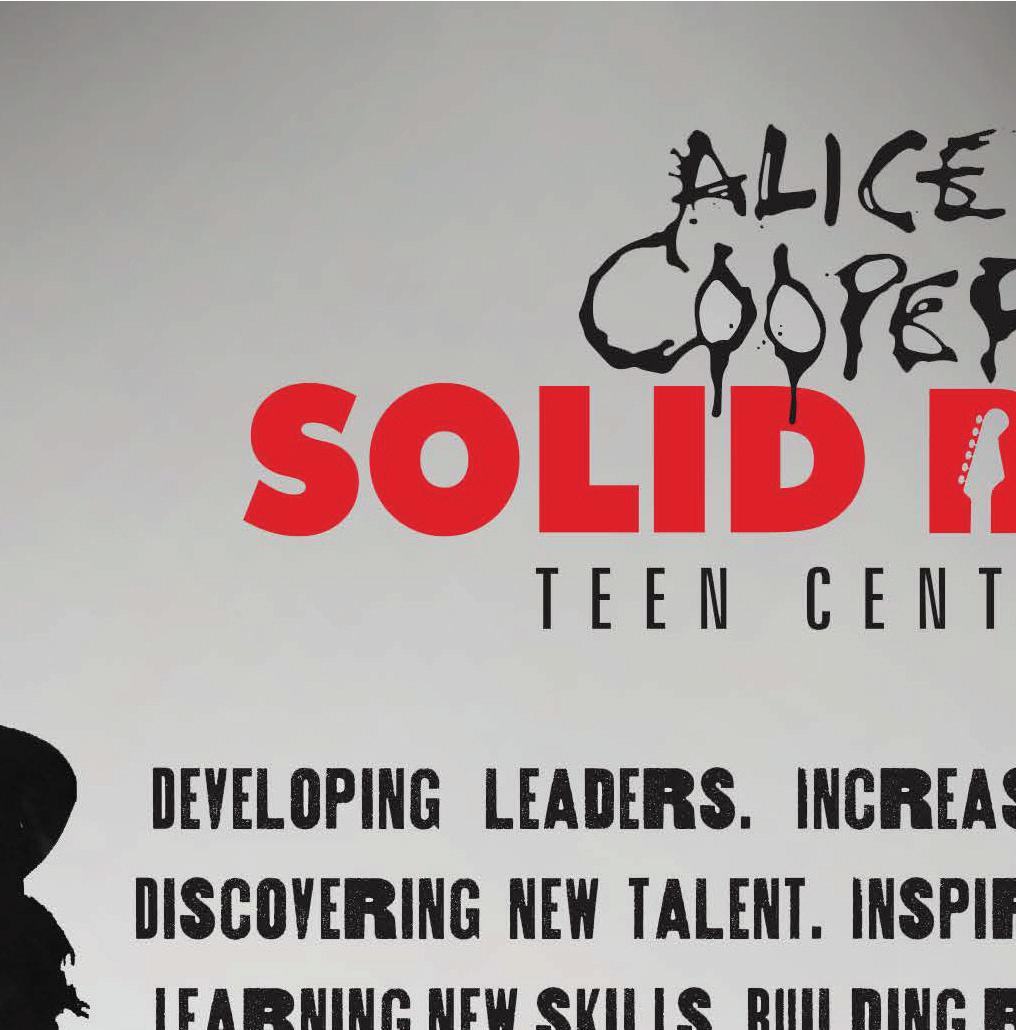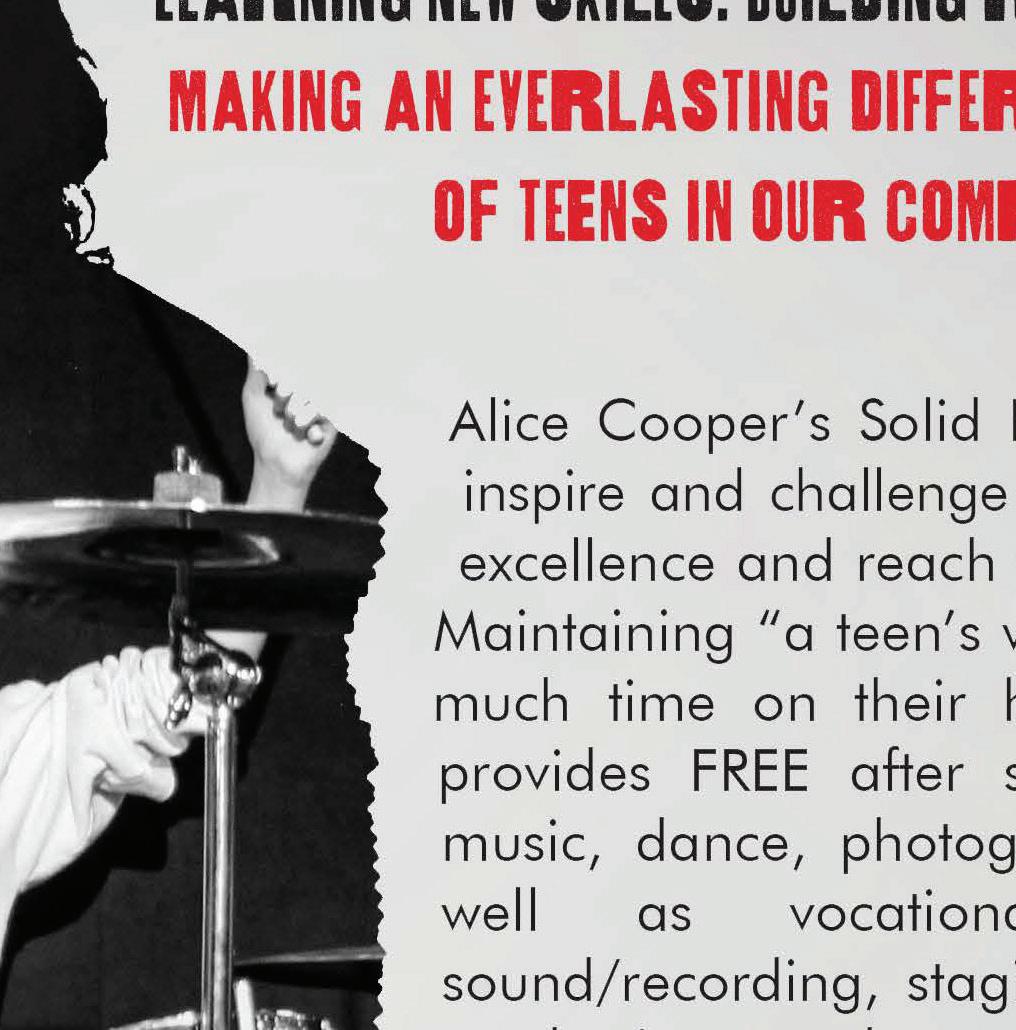
Thank you for subscribing to Today’s Professionals magazine. This magazine was created to encourage and motivate professionals in all stages of their career. We also want to highlight companies who invest in their team members through training and promotion.
We hope Today’s Professionals magazine will be your go-to place for best practices in the areas of business etiquette, networking, and communication. You will read stories of how people use soft skills and emotional intelligence to attract potential clients, infl uence decisions, and maintain their customer base.








We invite you to share your stories and comments and ask questions by emailing us at info@todaysprofessionals.com
Julie Jones Wakefield







 AIM for Success,
AIM for Success,
“Technical skills will get you to the door, but soft skills will open the door to your success. “
Chapter













Content
Magazine Design by SmartFem Media Group
Chapter Four Business Dinner Playbook
Networking Fundamentals
Chapter Five
Owning
One AIM High and Open Doors for Your Career Potential Chapter Six
Your Place
Chapter Two Nailing A Job Interview
22 28 04 34 12 16
Chapter Three 6 Tips for becoming more charismatic
Julie Jones Wakefield





















Today’s Professional Magazine 4.
AIM High

and Open Doors for Your Career Potential
Eight years ago, I was asked to work with a group of interns at a large IT company. Many of them had just graduated from college and this was their first career job. My class was part of their nine-month onboarding program and was a one-day class that focused on soft skills, best practices for creating a professional image, business meeting procedures, business entertaining and networking, dining etiquette, and respecting cultural differences. It was a hit with both the students and the managers. I now teach this class yearly and have taught it at four different locations for the company.
Soft skills and business etiquette classes are increasingly popular today because technology has taken the place of face-to-face communication, and because many companies are transitioning back to the office after a work-fromhome policy during the COVID pandemic. The problem is we have forgotten how to conduct
ourselves in the office and at business events. Corporate America is seeking ways to enhance the customer experience and build a stronger brand image through the interaction of team members.
Several years ago, Harvard University, The Stanford Research Institute, and The Carnegie Foundation conducted research on what determines success. The research revealed:
Eighty-Five percent of a person’s success comes from his/her ability to connect with others.
Soft skills are what determine success. Yet, in classrooms across the nation, the focus is on technical skills: math, language arts, history, science, etc. Those skills are certainly important, and it gets you in the door, but those who rise to the top understand how to build relationships and how to influence others. In other words, your EQ is more of a determination of your success than your IQ.
When hiring, employers look for candidates who have a good work ethic and attitude, will add value to their team, and who have developed their soft skills.
Today’s Professional Magazine 5.

“Eighty-Five percent of a person’s success comes from his/her ability to connect with others.”

Here are 3 tips to help you AIM high in your career, and be a rock star during the first year of your new job.

Attitude.
Keep a positive attitude. Even though you are a new member of your team, you can add value and earn respect.
• Say yes to opportunities. Every time you are asked to take on a project, it’s an opportunity to show what you can do. Embrace new opportunities. Your team will appreciate you and will respect your initiative.
• Be present. Both physically and mentally. If you need to take time to handle personal situations, do it. However, being on your personal phone during work hours is distracting and will lower your productivity. When you are in meetings, participate in the discussion and avoid mentally drifting off. Stay engaged, take notes, ask questions, and clarify important points.
• Be humble. This means accepting suggestions and constructive criticism from others. You don’t know what you don’t know, so don’t take it personally when your manager provides feedback. Simply smile and say thank you. Then, work to make the changes suggested. Avoid blaming others for mistakes. Take responsibility when things go awry. And, don’t gossip or try to get others to take your side. Situations are temporary and how you handle mistakes makes all the difference.
• Never stop learning. Your professional and personal growth should be ongoing throughout your career. Read books, ask to attend classes, and set personal growth goals each quarter. Not only will you feel a sense of pride and success, but your team will also respect you. The more you learn, the more opportunities for promotion will come your way.
Image:
Your image includes your appearance, how you treat others, and your attitude. Most employers will hire for attitude and train for skills.
• Dress appropriately. You only get one chance to form a first impression, and your appearance is the first key to a good impression. Follow your company’s dress code and remember even when you attend work events after hours, you are still working. When in doubt, it’s better to be a little overdressed..

• Smile! People are drawn to happy people. Don’t let others know even when you are having a bad day. It’s a fact when you smile, you feel better, and you project positive energy. Be a person who brings light into a room.
• Respect differences. It’s okay to have differences. It’s how we handle those differences that create a negative perception of others. We all come from different backgrounds, and cultures, and have had varied experiences in life. Embracing differences builds stronger teams and encourages individual growth.
Today’s Professional Magazine 8.
Manage Yourself:
• Watch your words. Avoid sarcasm, swearing, and vulgar language. You may think you are being funny, but most people don’t know how to take sarcasm. Additionally, off-color and demeaning jokes are offensive. By keeping your words positive and remembering basic manners such as “please” and “thank you” you will generate trust among your peers and clients, and you will have more opportunities to advance in your career.
• Understand time management. Being on time to work or for meetings is the first indicator of a good
attitude. It shows you respect other people’s time. If you are going to be late, let your supervisor know. Additionally, know how to use a calendar, prioritize projects, and meet deadlines. If you are running the meeting, create an agenda and send it to all participants before the meeting, and stick to the agenda as well as the time allowed for the meeting.
• Ask for help. Completing work on time keeps projects moving forward. If you are on a team and come across a task you don’t know how to do, get assistance. Asking for help is a strength. It shows initiative and you are willing to learn.




Understanding the power of soft skills will help you create more meaningful business relationships and will create the confidence you need to take your career to the next level. Even if you do not consider yourself a charismatic person, these tips will help you step into your own personal brand and leverage your strengths in any room.
Julie Jones Wakefield
The premise of business etiquette begins with treating others with respect. In her years as both a business professional and educator, Julie Jones Wakefield gained a unique perspective on developing and maintaining relationships in the workplace. She saw first-hand how being respectful, truthful, and a good communicator would open doors of opportunity.

As an educator, Julie realized the importance of teaching respect, integrity, and trust. Her desire to teach more than academics led her to the Protocol School of Washington where she became a certified corporate etiquette and international protocol consultant.
As an entrepreneur, Julie was able to train her team members on how to communicate with customers, educate rather than sell, and to build trust by providing an exceptional customer experience. She says, “In business, technical skills get you to the door, and soft skills open the door for success.”
Julie is a sought-after speaker and training facilitator. She teaches leadership development in high schools, assists university students and student-athletes in the transition from college to the workplace, and works with corporations on maintaining a positive business image, improving the customer experience, and building positive relationships in the workplace.
Today’s Professional Magazine 9.




COME JOIN WESOS... AMERICA'S FASTEST GROWING FEMALE ENTREPRENEUR NETWORK TO FIND OUT MORE GO TO HTTPS://WWW.WESOSNETWORK.COM/JOIN-OURSISTERHOOD













6206 E Test Drive Mesa, AZ 85206 602-814-0744 SSLEXUS.COM SOMETIMES FRESH AIR CAN TAKE 2022 LC CONVERTIBLE
Nailing A Job Interview





Today’s Professional Magazine 12.
the 4 Cornerstones of A Successful Interview
It’s a widely agreed upon opinion that interviewing just may be one of the most painful life experiences causing a high degree of stress and anxiety, even for the most experienced candidate. No one (as far as I’m aware) enjoys the feeling of being judged and let’s face it, interviewing for a job is THE hot seat for judgment. You are being judged by what you wear, what you say, and of course what you do, in the interview and for a living. Can you do the job? Do they want YOU to do the job?
Willingly walking into a situation where you know you will be judged and still perform at a level that generates an offer at the end is a skill in and of itself. That said, this
is a skill that can be mastered. With a little practice and a general understanding of what the average hiring manager wants to know about you, a job interview can be a means to not only your next job opportunity but also to build your professional network.
There are four cornerstones to a successful interview: your professional presentation, your attitude, your ability to connect with the hiring manager or interviewer, and the ability to adequately convey your professional experience as it relates to the position. Notice the order of the cornerstones? That’s not by chance, in theory, you have the experience they are looking for, that’s why you got the interview. The hiring manager needs to know

if you are a fit for their organization, do they want to work with you for 8-10 hours a day. These four cornerstones, when mastered will at minimum keep you in consideration when it’s offer time.
PROFESSIONAL PRESENTATION
Professional presentation is a vague term, one that confuses many and one that’s meaning has shifted a great deal in the last two years. If COVID gifted us one thing, it is a more casual environment for most. It is very important to do a little research on the organization you are interviewing with prior to your in-person meeting since the rules of “professional dress” have changed. What is their typical dress code,
Today’s Professional Magazine 13.
jeans? If so, slacks and a blazer might be enough to impress.
Today’s more casual and frankly more accepting job market has changed the meaning of “professional” for many organizations. It’s till good practice to cover those tattoos, tone down that jewelry and make-up to more conservative options. Pay close attention to hair and nails; men,
ensure your nails are short and clean. For women, nails should be manicured, and polish can go a long way. It’s best to present a more conservative color and length. Avoid wearing anything with a fragrance, perfume, lotions, etc., and remember the most important thing – SMILE!
ATTITUDE
We all know that first impressions matter; it only takes seven seconds for someone to form a solid impression of you. While much of that is your professional presentation, you can kill that positive first impression in fewer than seven seconds with a poor attitude. A few quick tips to convey a positive attitude:

Today’s Professional Magazine 14.
• SMILE – yes, this again.
• Treat everyone with respect, the receptionist, the janitor –everyone.
• Speak positively about ALL things: previous or current employers, managers, and experience. Speak to what you learned, not what you didn’t like.
• Be (or appear) confident! Fake it if you must, confidence is huge. Hiring managers want to hire candidates that not only can do the job but will excel at the role.
• Pay attention to what you feed your mind. Negativity surrounds us on tv, in music, the news, and often our circle of friends. What you see, hear, and watch impacts what you think, feel and how you act. This can impact what you say and even how you say it in an interview.
Quell the anxiety, anxiety is a confidence killer. Power pose, do your research, prepare your answers to the common questions, and practice speaking positively about all previous employers – your preparedness will help keep your anxiety at bay.
CONNECTION
Once again, SMILE. Your ability to connect is largely impacted by how friendly you appear. Smiling has been proven to not only impact the way others view you and your approachability but also how you feel about yourself. There is a physiological shift in the body releasing endorphins, buffering the effects of stress when we smile.
Make eye contact, this one seems obvious, but stress and anxiety can cause us to divert our attention. It’s difficult to engage with someone when they appear to be distracted.
Ask questions and answer questions in complete sentences, yes or no answers will drastically impact your ability to connect and make you appear as though you are avoiding the questions or giving the impression that you don’t know the answer.
Be prepared, know as much as possible about the company, the role, and the person you are meeting with. LinkedIn, Google, and social media can tell you a lot about people. Trust me when I say, they are looking at yours.
SKILLSET
It’s your time to shine! Sell sell sell yourself. Your experience got you the interview. Practice conveying your experience with someone you know, rehearse so you don’t stumble. Your ability to effectively share your knowledge as it relates to the role is essential. Be ready to speak to outcomes, quantifiable if possible. If you don’t have all the experience they are looking for, focus on the experience you do have and speak with conviction and confidence. Help the hiring manager realize that you are the obvious choice for the position.
In summary, dress for success, keep a positive attitude, connect, and sell yourself. Don’t be afraid to share your enthusiasm for the role, ask for the job.
Ask if there is anything you’ve said (or not said) that would lead them to believe you are not a fit. Attempt
to address their concerns while you have the chance. The goal of the interview is to get the offer, at minimum – keep you in the game for consideration. Now go get em’! You’ve got this!
Kimberly Shapiro is the Chief Operating Officer for a Texas based staffing and recruiting firm, Sage Search Partners, based in Plano, TX. She has 15 years of experience in the staffing industry placing Executives, Accounting & Finance, and Human Resources professionals.

Kimberly earned her coaching certification in 2017 specializing in Executive Presence and Leadership Development. She holds a bachelor’s degree in Organizational Leadership and a master’s in Organizational Technology and Learning from Texas A&M University –Commerce.
KIMBERLY D. SHAPIRO
Professional Career Coach | Staffing And Recruiting Executive | Podcaster |Public Speaker
Today’s Professional Magazine 15.
6




Tips for becoming more charismatic
By Lea Woodford

Likability is what draws us to charismatic people. They are naturally friendly and inspire trust immediately.

Today’s Professional Magazine 17.
Charisma is a skill set that the most successful leaders have. Throughout history, we have seen examples of people who inspire extraordinary outcomes from ordinary people. Charisma isn’t easily understood, as it is not something you are born with; it’s something you cultivate. For a professional speaker charisma is a must in order to connect with your audience.
Charisma has nothing to do with your age or dress size, although it helps to be attractive and in shape. There is good news is, however, you can learn it. Some of the most charismatic leaders were not always the most attractive. Winston Churchill and Mother Theresa were some of the worlds most influential and charismatic leaders, while neither were considered particularly attractive.
What is charisma?

Charisma can be used as a noun but is much more powerful when used as a verb. Charismatic people possess three common traits: confidence, a presence and are very likable.
Confidence
Confidence is charismatic. When you are confident, you are exuding the best version of yourself to others. People are naturally attracted to people who are sure of themselves.
Presence
Presence is the feeling that you get when someone charismatic is speaking. Charismatic people can make you feel important and
that your thoughts and opinions matter. They are great listeners and allow others to partake in the conversation.
Likability
Likability is what draws us to charismatic people. They are naturally friendly and inspire trust immediately. They are a joy to be around, and this is what generates charisma.
Here are Six ways to improve your charisma
Try these techniques to build confidence, presence, and likability to become more charismatic:

1. Talk about your passions
Have you ever noticed how people
Today’s Professional Magazine 18.
light up when discussing their passions? When meeting new people, discuss things you love and are excited about, as excitement is contagious. It will also ease your anxiety when meeting someone new. Discussing something you love will not only make you more charismatic, but it is a great confidence builder.
2. Be an active listener.
People’s most significant challenge is listening actively with intent. So many people are in the habit of interrupting and interjecting when someone else is talking. When speaking with others, try to make a habit of listening to them with focus. People want to be seen and heard; they will feel heard and validated if you practice listening without interrupting them. Active listening is one of the traits that the most charismatic people practice. They are not checking their phone or doing anything other than listening to the conversation.
3. Eye Contact
Having consistent eye contact is a must while having conversations. It demonstrates that you are genuinely interested in what someone is saying. It is essential to
make eye contact but not so much that it becomes a stare and makes people feel uncomfortable. If this makes you uncomfortable, focus on their eyebrows or nose, as they won’t be able to tell the difference.
People you speak with won’t be able to tell the difference when you do this. Remember looking around when you are talking to someone makes them uncomfortable and shows them that you don’t value the conversation.
4. Ask clarifying questions

Ask multiple questions for clarity when talking to a subject matter expert on a specific topic. Asking questions shows the person that you are interested and actively involved in the conversation. When you ask questions, it also opens up opportunities for the exchange to go in other directions.
5. Demonstrate a genuine interest
Only seven percent of communication is verbal, so it is crucial to master non-verbal clues. Facial expressions, hand gestures, and voice inflection can demonstrate excitement and interest in the topic you are discussing. Practicing general interest and active listening makes
the person you speak with feel more valued.
6. Keep things light and positive
We have all heard that you shouldn’t discuss religion or politics with people you don’t know. Keeping things light and positive will put others at ease and keep them engaged. You will be helping position yourself as a person who is comfortable to be around. Meeting new people can be one of the most stressful events for some people, so keeping the conversation light and positive will go a long way to ease the discomfort of others.
Charisma is a skill most people aren’t born with but rather one cultivated. It is a matter of learning the skills and practicing them.
Charisma is a skill set that will serve you well in virtually every aspect of your life regarding school, jobs, friends, and relationships.
In conclusion, being charismatic gives you a magnetic presence, allowing you to attract the right people who believe in you and your endeavors. Charisma is an essential life skill and not something most people are automatically born with but rather something they learn. Look at some of the most influential leaders of our time, such as Oprah, Steve Jobs, and even Abraham Lincoln; they all had charisma.
If you want to change your life and your business, learn how to harness the power of charisma.

Today’s Professional Magazine 19.
Lea Woodford is the Chief Executive Officer and founder of the SmartFem Media Group, full-service digital marketing, and advertising company. SmartFem was created as a result of her many years as a publicist, columnist, and as Radio & TV Personality. Lea has extensive experience as a media personality and developed her own segments for ABC, NBC, CBS as well as Fox Networks. One of her favorite projects was “Looking for Love with Lea,” a popular Thursday night radio call in show for singles. Lea has also chaired, organized and Emcee’d for a number of organizations including non-profits such as Camp Soaring Eagle, American Heart Association, Make A Wish, Alice Cooper’s Solid Rock Foundation, and St. Judes Hospital. Lea became an international
speaker in 2007. She has been on multi-city tours and has shared the stage with some of the world’s most respected speakers. When it comes to speaking, Lea is a breath of fresh air, focusing on relationships, innovation, and change to drive business. Her inspirational stories and humor will engage audiences to start thinking bigger. Lea speaks from experience as she shares her stories on making her online magazine into a full-service digital marketing and advertising company. She encourages her audience to think bigger and bolder about their own business. Lea motivates her audience, in the same manner, she motivates her team, “find your voice.” Lea shares her ups and downs as well as her successes and failures – to give your audience a fresh perspective on marketing, leadership, innovation, and customer service.
Online marketing, and social media expert, Lea shares the latest trends to help companies move to the next level in the ever-changing digital space. Lea is an expert and a top speaker. She walks her talk. She will impart valuable information in a fun and entertaining way and will leave your audience wanting more.
Achievements
• Named "Dynamic Woman of the Year," by Phoenix Business Journal

• Amazon Prime TV Talk Show Host
• Founded SmartFem Media Group
• Created and Hosts the SmartFem Success Summit
• Corporate Event Planner
• International Speaker
Today’s Professional Magazine 20.


 Lea Woodford, CEO
Lea Woodford, CEO
Take your business to the next level with Personal branding by Luxury Media Brands. For more info contact Lea@SmartFem.com
SmartFem Media Group
Business Dinner



Choose a restaurant with a variety of food

Arrive 15 minutes early and introduce yourself to the server Stand to greet your guest when he/she arrives. Playbook
Eating out professionally can be intimidating, especially for young professionals. Many of my clients have expressed that they lose their competitive edge because they are so self-conscious during business meals.

While knowing what to do with your napkin, which knife and fork to use, and how to order wine may feel like the most important part of the meal, there are other essential steps to consider which will help you gain the confidence you need to earn the respect of an important client. Don’t get me wrong, basic dining etiquette is important, and
it’s the most requested topic I have from clients. However, the small details of planning a business meeting during a meal can have a huge payoff for you.
Here are a few tips to make you feel more in control of a business meeting at a meal.


Ask for a table away from the busy path to the restrooms, kitchen, and bar area. This will help reduce distractions and keep your client focused on the conversation.
3
1
Choose a restaurant with a variety of food. This will give people with food restrictions and/or allergies more choices.
Tell your guest the host is expecting him or her. It will make your client feel special when the restaurant staff knows his/her name. Meet your guest at the table.

4

Visit or call the restaurant in advance and let them know you will be hosting a business meeting.
2
Arrive 15 minutes early and introduce yourself to the server. Confirm that you are the host of the meeting and request that the bill not be brought to the table while the guest is present.
Today’s Professional Magazine 24.
While waiting on your guest, avoid touching anything on the table, ordering drinks, or eating bread that may be on the table. You want your guests to arrive at a clean table.

Stand to greet your guest when he/she arrives.
Ask your guest if he or she would like a beverage. This is an excellent time to let them offer a cocktail or wine. If you are not drinking alcohol, let your guest know at this time. If you do order alcohol, limit it to one.

8
Remember, this meal is not about the food or drinks but is about building a relationship. The focus should be on the conversation and not on the food. Therefore, keep your order as simple as possible. 9Save the serious conversation of business for the end of the entrée portion of the meal or for dessert. In most cases, lighter business conversations will be sprinkled throughout the meal. 10
When your meal is over, place your napkin on the table and escort your guest to
the door. Return to your table to pay the bill. This avoids the awkwardness of paying the bill in front of your client.



I recommend practicing going through a business meal with a friend or colleague before taking a client out. Additionally, I recommend clarifying with your manager policies for business entertainment, using the company credit card, or expense reimbursements.
If you would like help with dining etiquette, contact my office for class offerings and options.
5
6
7
Today’s Professional Magazine 25.











































Hire J lie to Spea at o r e t E e t call 972-268-9500 or e ail Info@ oda sProfessionals.co
Networking Fundamenﬔls






 By Paul E Maynard
By Paul E Maynard

Today’s Professional Magazine 28.
Written by Paul Maynard for Julie Jones after our call of 09-14-22; revised 09-18-22 after notes from JJ; re-revised after call with JJ on 09-20-22
Networking is a craft, a skill, and necessary. Nothing in business can replace one’s network. Nor should one downplay the importance of their connection to others. It is the framework of business.



Relationships make up a community. And, unlike sales in business, it is not about a transaction or need to have an “ROI.”
Three things you must keep in mind as you shape and build (and use) your network:

• Networking is not about a job or a sale
• Your network is incredibly valuable

• This is not about you
Yet, there are things one must consider as they go about networking. As you move out and about, keep these key questions in mind:
• What is your strategy or plan?
• Do you have your story together?
• Who knows you, what you know, and who do you know?

• Are you carrying your business cards?
• How will you follow up?
Today’s Professional Magazine 29. Networking is both a skill and an art. It takes practice. Patience. Persistence.
Let’s start at the top:
Strategy. Who do you want in your network? Where will you go to meet people—virtually or in person? This is like any other business venture—strategy, goals, objectives and tactics (don’t just jump to this first, be different). Map it out like you would any other part of your business. And the results are measurable, too. Let’s delve a little deeper:
• Who do you want in your network? Is there someone out there that you want to do business with? Or someone who is connected to others you would like to know? Or is there a like-minded individual you want to connect with?

• Where will you go? Check out your local chamber of commerce for networking group. Or join your alumni association’s local chapter (be sure and go to more than game watching parties!).
• Set some goals. How many people do you want in your network? Write up a scope , set a schedule and figure out if there are any expenses involved—admission, donations, or just a bar tab.
The point here is to make sure you have a plan that you can follow.
Your story. Do you have it down?
From your elevator speech to a few key stories that can be used to enhance a conversation and (or) help describe and introduce you further, you need to be armed with a narrative. As for the elevator speech: It is the basic tool of the networker. That 15- to 30-second collection of words that you say when asked about who you are and what you do:
• First, remember this is about brevity. Get to the point.
• Start and finish with your name (and company, if appropriate).
• Distill what it is you (and/or your company do/does).
My speech goes something like this:
“Hi, I’m Paul Maynard. I’m an independent business and marketing consultant based in Dallas, Texas. I provide a variety of services to a number of industries ranging from manufacturing to industrial services to technology. I’m Paul Maynard.”
State your name, describe your
offering simply and state your name again. The second sentence can go away if the elevator ride is shorter. Remember, this is about starting a conversation. It’s the monologue before the dialogue. And once you’ve said it, always remember to ask the person you are talking with about themselves. Its’ polite and, besides, you might hear a really good elevator speech.
Some good opening lines:
• Where did you come from?
• Where did you go to school?
• Who else do you know in the room?
• And my favorite conversation starter: “What brings you here today?”
Who you know and who knows you? Really, the key: who are you connected to that they might know? The Kevin Bacon 6-degrees of separation thing is really more like three. Being connected and plugged in is really both hard and easy. Hard because you really have to work at building a network of known (to you) people. Easy because, once you’ve trained yourself to do it, you will find
Today’s Professional Magazine 30.
yourself in every conversation asking yourself: “Who do I know that I could connect to this person?”
Business Cards. You really need to have them with you everywhere you go. Everywhere. Not just to business meetings, but to the grocery store and to the beach. I have some in the handlebar bag on my road bicycle. And I’ve traded them!
And let’s not forget the digital revolution of business cards. Your identity comes across in several ways. Be able to identify yourself and share your contact information readily.
Following up. As you are in conversation with a new contact (or
even a familiar one) you should be thinking: “How am I going to follow up?” Is it a phone call, email or faceto-face meeting? And why? And it should NEVER be a sales call—this is about getting to know someone.
Again, train yourself to look for cues from who you are talking with about if, and how you want to follow up.
Remember those business cards? If you’ve been collecting them during an event, considering coming home and sorting them. Try this as a classification system:
• “A” leads are those you want or need to call RIGHT NOW. They can lead to business immediately or are otherwise
powerful connections.
• A “B” lead is important, but deserves a lesser approach such as an email or phone call follow up at the end of the show or a few days after the event.
• “C” leads are either disposed of or just added to a mailing list. Not that they aren’t important, they just are not as important or relevant as the A and B leads.
Networking is both a skill and an art. It takes practice. Patience. Persistence. And it is NOT about you! Happy networking!
Relentless

Today’s Professional Magazine 31.
Writer. Business consultant. Networking guru. Podcast manager. Trade show manager. Voice actor. Children’s book author A few of the titles I’ve earned during my career. I’ve put my expertise into practice in a number of ways. I am the:
• Blogger and speaker behind The Relentless Networker’s “Networking Tips” series.
• Author of the “Harry Discovers…” books, website and social media sites.
• Podcast manager for “Coffee With Claire.”
Paul Maynard

• Original producer of the NDCC’s “Big D BBQ Battle.”
• Trade show manager for several Fortune 100 companies.
• Matchmaker between corporations and exhibit companies.
• Originator of student jobshadowing programs.
Clients include HMS Healthcare, Rentech Boiler Systems, HewlettPackard, The Boeing Company, Dynanet, Elevate Windows, Esterline, FRONTLINE ER, Hope Clinic Garland, Lockheed Martin,
Russ Berger Design Group, Today’s Professionals, and Parker University.
Contributing editor and writer, OffBeat Business Magazine. Contributing writer, FRIdays Magazine and Industrial Water World Magazine. Script consultant to A Savory Moment and Coffee With Claire podcasts

Today’s Professional Magazine 32.





www.LegacyJetServices.com



YOUR PLACE
OWNING
Starting a new career can be overwhelming. Although many years of school and training have prepared you for the path you are embarking on, there is always that gutwrenching fear of not being prepared or mentally ready. The first thing that you need to acknowledge is Imposter Syndrome happens to almost everyone.

Impostor syndrome (IS) refers to an internal experience of believing that you are not as competent as others perceive you to be. While there is no magic cure for Imposter Syndrome, there are things that you can do to acknowledge that it exists in your life and there are many ways to overcome IS. Whether your imposter syndrome is Perfectionist, Soloist, Superwomen, Natural Genius, or Expert, you are not alone and there are ways to overcome IS.
Each day, I ask myself, what can I do to inspire confidence in the people that I lead or simply the people in my life? What I would tell you is this:
Today’s Professional Magazine 35.
2. It’s okay to encourage yourself.


3. Surround yourself with people that bring out the best in you.
4. Don’t be afraid to ask for help
5. Trust yourself and get rid of selfdoubt
To inspire confidence in others, one must be comfortable with who they are and what they have to
others are around you, the greater the outcome. When others are inspired, a few things happen:

• Productivity increases


• Teamwork improves
• Creativity flourishes


• Goals are not only met but exceeded
• Everyone walks away with a sense of accomplishment
Overcoming imposter syndrome

just happens. Here are a few things that you can and should to do overcome imposter syndrome:

• Owning and celebrating achievements is essential if you want to avoid burnout, find contentment, and cultivate selfconfidence.
• Steer away from external validation.
• No one should have more power to make you feel good
Today’s Professional Magazine 36.
• Learn to take constructive criticism seriously, not personally. Always be willing to listen, learn, and grow.
• Try seeing yourself as a work in progress
• Rather than beating yourself up when you don’t reach your impossibly high standards, identify specific, changeable behaviors that you can improve over time.
• Realize there’s no shame in
asking for help when you need it.
Regardless of how you show yourself, practice making a personal impact. Check your own box of self-confidence before committing to being the hero that you are. If self-care is absent, you will fail to thrive. Burnout happens when you fail to invest in yourself.
Throughout my career, I’ve been able to grow and learn through every season. Some of the major takeaways that I want to highlight that I hope you find great value in are the following:





















1. The view from the bottom does not look like the view from the top.



• Your view is valued and important, regardless of where your view is from.
• If you are not part of an organization that values you from where you are, don’t be afraid to move.
2. As you grow, learn that it’s important to learn, but it’s also okay to manage up.
3. Sometimes you must shift gears.
• If you are not where you should be or the plan is not working out how you expected, it’s okay to scrap your existing plans and shift gears.
• Don’t get complacent. Staying in the wrong place too long can have a negative impact.
4. No one cares more about your success and growth than you do!
5. Surround yourself with people that are bigger than you! What bigger looks like is up to you. They may be smarter, they may have more experience, and they may have something that you aspire to have. Whatever that bigger looks like, surrounding yourself with people that help you grow will HELP YOU GROW!
6. It’s okay to not know!




7. Not everyone is pulling for you! They may say the right things, but if their actions don’t align, move on quickly.


8. You are in the driver’s seat of your career.



9. Integrity ALWAYS matters. Don’t let anyone tell you that it’s ok to take shortcuts. Do the hard stuff!
10. No one can live your dream for you; therefore no one can tell you exactly how to get there.
There will always be aha and gotcha moments throughout your career. Take your blinders off and know that they are coming. Your job is to be prepared for what is to come and to be confident in yourself as they come. Don’t let Imposter Syndrome or self-doubt undermine your confidence, because chances are you are the SH%T!

Today’s Professional Magazine 37.
Wendy Stewart


Vice President of Sales Operations DataBank, Ltd.

Wendy joined DataBank in 2013, as the Director of Client Relations. She is currently Vice President of Sales Operations for DataBank. In her role, she is responsible for leading Sales Operations for DataBank.
Wendy’s primary focus lies in the development of strong customer relationships which allow the company to better identify and serve a client’s business objectives. With 20+ years in the data center and telecommunications industries, Wendy possesses the creativity and dedication to deliver superior service. Prior to joining DataBank, Wendy served as a Senior Client Relations Manager of Major Accounts for ViaWest. She has also held numerous positions in both sales and service delivery for Centric Voice and Level 3 Communications. Wendy holds a bachelor’s degree in Business Management and a minor in Ministry and Leadership from Dallas Christian College. Actively involved in her community, Wendy also completed leadership training as a part of ‘Leadership Richardson’ and is currently active and serving on the Junior Achievement of Dallas Board of Directors and 7x24 Lone Star Board of Directors. Wendy formally served on the Salvation Army Advisory Board of Directors and served her city as a member of the City of Sachse Planning and Zoning board.
Wendy Stewart is also the CEO of Inspiring Hearts and founder of Dallas Women’s Data Center Group.

She also chairs the WiMCO Lone Star Chapter



Today’s Professional Magazine 38.


We aims to provide you with the answers before the questions are even asked Our foundation is comprised of leading market talent and seasoned recruiting professionals with tenacious career aspirations to provide paramount service without the large-firm bureaucracy With this mentality, we are able to connect with our candidates by understanding the importance of identifying a long-term career move; and align our focus with that of our clients by deploying a search tailored specifically to their individual needs. Learn more about SAGE Search Partners 214 814 9255 | www sage-search com Dallas/Ft Worth Houston Austin National Interim Staffing: Direct Hire: Areas We Serve Services Direct Placements Temporary Temp-to-Hire Management Consulting Payroll Specializations Accounting & Finance Administrative & Clerical Human Resources Tax & Audit Non-Clinical Healthcare Investment Banking SAGE Search Partners is a professional direct placement and temporary staffing firm with a national presence, specializing in Accounting & Finance, HR & Operations, Non-Clinical Healthcare and Investment Banking.

For Media Inquiries or advertising opportunities call 972-268-9500 or email or Info@TodaysProfessionals.com
















 AIM for Success,
AIM for Success,









































































 Lea Woodford, CEO
Lea Woodford, CEO































 By Paul E Maynard
By Paul E Maynard
















































